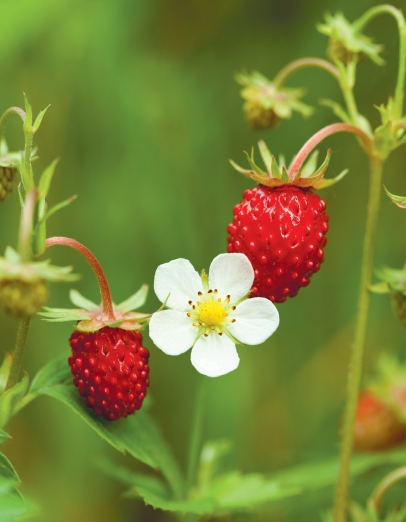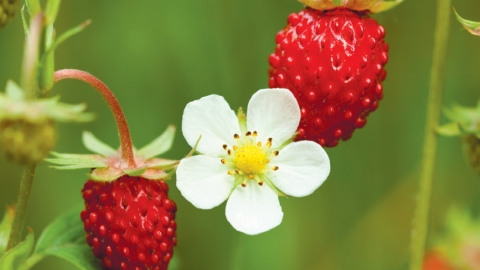Strawberry Moon Thanksgiving
Expressing Gratitude for Seasonal Gifts Through Storytelling
Storytelling moons are used to share traditional Native American lore and it was this way that I learned of the special gift of strawberries. As the story goes in our tradition, my Algonquin community was given this gift, by Creator, in acknowledgement of our great care of each other and Mother Earth. In this story, the berries are lined up and informed by Creator that their level of sweetness will depend on how much sunshine they absorb. Strawberry, with her cute little freckled cheeks, wants to be first berry gift. Once she arrives, she eagerly holds her head high, turns bright red and absorbs the most sweetness. That is why strawberries are packed full of flavor and nutrients.
Native people live in reciprocity with the environment; therefore, gratitude for our seasonal gifts is shown monthly. It’s through storytelling that the instruction of seasonal food availability is offered. Information on where to collect the berry, how to give an offering prior to gathering it and the importance of reciprocity is shared through storytelling during Strawberry Moon Thanksgiving, held in late June.
June is a popular month for marriage. Another traditional Native story tells of a newly married couple’s first argument. They are walking in the deep woods when the disagreement occurs. Each of them storms off on an opposite trail, insistent on being rightfully angered. It is not long before the woman begins to feel sorry for the argument and cries. As her remorseful tears hit the ground, they become bright red strawberries. She tastes their sweetness and decides right then to gather them as a gift of reconciliation for her husband. After filling her birchbark basket with the peace offering, she heads back to find her husband. She discovers that he, too, is heading towards her to seek forgiveness. They embrace and express regret for their behavior. Strawberries become a symbol for mercy, forgiveness and reconciliation. How delicious it is to receive a portion of mercy and forgiveness!
These sweet little berries, enjoyed by my ancestors, continue to bring joy to our community. They are a dietary staple and used in both traditional and contemporary recipes. It is becoming more difficult to find wild strawberries, yet that scarcity contributes to their specialness as gift offerings. Summer strawberries are dried and stored for yearlong use. They are added to jonnycakes (journey cakes) providing much-needed vitamin C, which wards off illness, to winter diets.
My family has a food stand at the Narragansett Powwow where we serve handmade strawberry lemonade. This past summer marked our 347th recorded annual August Meeting in Charlestown, Rhode Island. Many people visiting our booth mention that strawberry lemonade is a refreshing summertime powwow favorite.
In her book Braiding Sweetgrass: Indigenous Wisdom, Scientific Knowledge and the Teachings of Plants (Milkweed Editions, 2015), author and enrolled member of the Citizen Potawatomi Nation, Robin Wall Kimmerer dedicates an entire chapter to strawberries. “Wild strawberries fit the definition of gift,” she writes. Her chapter indicates the significance of this little berry to Indigenous peoples and states that as a “gift-thinker” she would “want to kidnap” wild strawberries if they were sold in a grocery store. Kimmerer writes that the smell of strawberries is “the smell of June.” She describes the significance of making strawberry shortcake for her father’s birthday. Her affection and gratitude for the gift of strawberries transfers to the birthday treat given to her father. Only handpicked wild strawberries make it into her recipe.
Strawberries are indigenous to North America and have been an important source of nutrition for many Native tribes. There are over 500 federally recognized tribes in the United States and just as many strawberry tales. We offer thanks at every Strawberry Moon Thanksgiving for the two-legged, four-legged, winged, plants, insects and waterways and remember that our lives are interdependent. Whenever there is an environmental imbalance, all life suffers. We are reminded that when we take care of our environment, our environment takes care of us.






